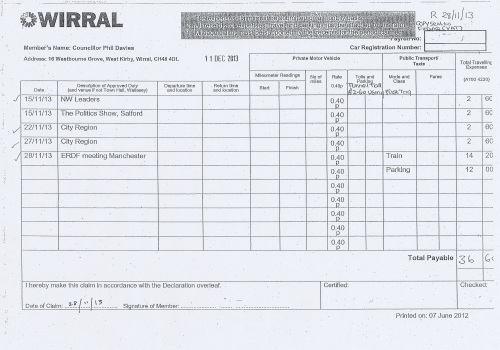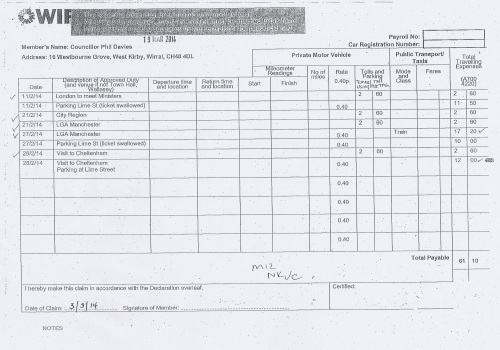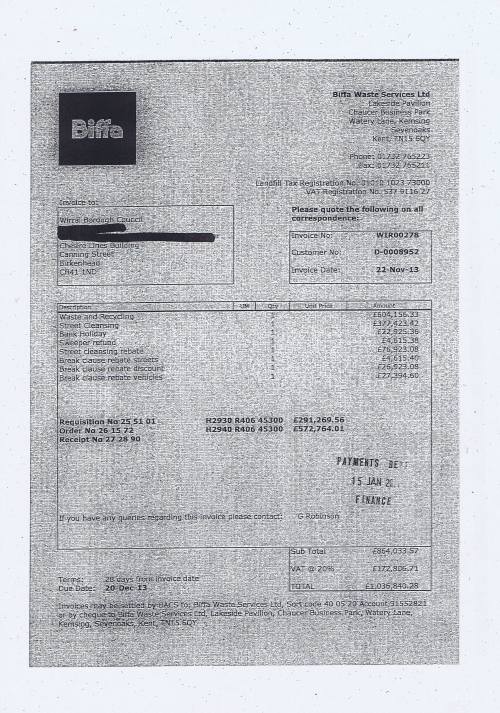Free School Meals and pages 87-88 of Wirral Council’s ~£12 million/year PFI contract with Wirral Schools Services Ltd

This is a small part of the Schools PFI contract that Wirral Council has that costs the taxpayer this year ~£12 million a year. This is part of a massive contract that I estimate being between 500 and 1000 pages long.
It relates to the following schools (one primary and eight secondary) plus two City Learning Centres:
Leasowe Primary
Bebington High
University Academy of Birkenhead (formerly called Park High)
South Wirral High
Weatherhead High
Hilbre High
Prenton High
Wallasey High
Wirral Grammar Girls
Wallasey City Learning Centre
Hilbre City Learning Centre
Before I start on quoting from the contract on page 87, I need to first explain what the following terms mean.
“Authority” refers to Wirral Council.
“Schools” are the schools listed above that are part of the PFI contract.
“Category A Consumers” means “school meals supplied to those pupils at a School who pay for meals and/or refreshments taken in the Catering Area of the Schools.”
“Category B Consumers” means “those pupils who have been notified to Projet Co as being entitled to free meals, and who take these meals in the School’s Catering Area.”
Category A Consumers & Category B Consumers are treated as non-business for VAT purposes. To be honest a lot of this contract is about tax!
“Category C Consumers” means “meals supplied to members of staff of the Schools and visitors who have been notified to Project Co as being entitled to a free meal are supplied free of charge by the Authority to the consumer and output tax is not applicable.”
“Category D Consumers” are “meals supplied to persons other than pupils who take and pay for a meal and/or refreshments are treated as taxable supplies for VAT purposes. Project Co shall include the appropriate rate of VAT in the prices charged for such meals and refreshments and supply output statistics and the value of VAT output tax to the Authority within a timetable specified by the Authority which has been agreed with HM Customs & Excise”
Right now onto the bit of the contract about free school meals (pages 87-88), my comments are in italics.
20.4 Free School Meals
(1) The Authority has a duty to provide free school meals to those pupils at the Schools who fall into Category B Consumers. Members of staff and visitors of the School who are Category C Consumers are also entitled to a free meal paid for by the Authority or School.
OK, reasonable so far, restates legal requirement in sentence 1. Didn’t know about sentence 2 though… which is a tad unclear as to who pays.
(2) The Authority will issue to all individuals referred to in Clause 20.4(1) a card (the “Smart Card“) in a design to be agreed from time to time by the Authority and Project Co, but including the person’s name, photograph and the name of the School, which shall be credited with cash equivalent to the number of free school meals that person is entitled to in that Contract Month.
Wow, things have changed a lot since my day. So, just because their parents are on means tested benefits, you’re insisting children have photo ID and presumably present such photo ID every time they get a “free school meal”? Sounds like it’s “free” but with strings attached?! OK, call me a civil liberties person who rejoiced when the Coalition government scrapped the ID card plan, but forcing children from poor backgrounds to use photo ID?? Maybe I’m just old fashioned?
(3) The Authority will, using its own data and confidential information on free meals, prior to the commencement of each Contract Month issue a list to Project Co of the number of persons entitled to free school meals.
So wait a sec, Project Co is being given a list of all children that get free school meals and children also have to present photo ID to get them? What’s the point of the photo ID then??? Why not just ask them their name or am I missing something??? Surely kids know their own name? Yes, it’s “confidential information” so why is Wirral Council handing it over to a private company as part of this contract??? *sentence deleted following editorial meeting* Bristol based Wirral Schools Services Limited was called Jarvishelf 2 Limited prior to 29th December 2000.
(4) Project Co will invoice the Authority on the last day of each Contract Month for the number of free school meals supplied to Category B Consumers at the Meal of the Day Price together with VAT if applicable.
Eh, I thought page 86 said that Category A&B Consumers were “non-business” for VAT purposes? I suppose I’m not a contract lawyer being paid an extortionate amount to write this stuff though.
(5) Project Co will invoice the Authority on the last day of the each Contract Month for the number of free school meals supplied to Category C Consumers at a charge pre-agreed with the relevant School together with VAT if applicable.
Free meals for staff and visitors eh? Must be one of the few perks of the job I suppose… mind you teaching staff have to put up with a lot so I suppose a “free school meal” is the least they deserve.
(6) In addition to Clauses 20.4(4) and (5), Project Co will invoice the Authority on the last day of each Contract Month for any function, hospitality or visitors’ meals supplied together with VAT if applicable.
Functions, hospitality, oh dear are we getting into “golf” territory again eh? OK, I can envisage visiting sports teams from other schools needing something to eat, staff from other schools and places, meetings held at the school etc, but how much “hospitality” goes on in a school anyway. I get the impression Wirral Schools aren’t inviting the Mayor of Helsinki over every week to their school for a start (or maybe they are?)
(7) Project Co in its capacity as agent for the Authority (or the relevant Support Service Provider acting on behalf of Project Co) will provide:
(a) to each Category B Consumer bearing a Smart Card, a meal to the value of the Meal of the Day Price; and
(b) to each Category C Consumer bearing a Smart Card, a meal to the value of the pre-agreed charge referred to in Clause 20.4(5).
Oh dear, cash seems so old fashioned now doesn’t it? What’s “Meal of the Day” anyway? Gruel? Bread and water? Maybe I’m thinking of Oliver (the musical). I find it worrying that even at primary school age kids are forced to use photo ID cards just to get what they’re entitled to although maybe that’s just the way society has changed. It’s enough to drive people to packed lunches! What if the poor child leaves their “Smart Card” at home, do they go hungry? No “Meal of the Day” for them? After all in the days of cash (yes seems I’m old fashioned), your friends could give you (or even lend you) the money if you were short at the till. No more it seems in these contracts for cashless school meals!
(8) If the price of a meal chosen by:
(a) a Category B Consumer exceeds the Meal of the Day Price; or
(b) a Category C Consumer exceeds the value of the pre-agreed charge referred to in Clause 20.4(5)
the bearer shall be responsible for crediting its card with the excess via the dining room tills and the Authority shall have no liability in respect of the excess. If the price of a meal chosen by a Category B Consumer or a Category C Consumer is less than the value of the Meal of the Day or the pre-agreed charge (as the case may be) Project Co or the relevant Support Service Provider shall be entitled to retain the excess.
Wow, just wow. Let’s take a hypothetical Meal of the Day price at £2.30 (which this recent article about the Cabinet decision on increasing it helpfully provides). If someone choses items to eat that go over this £2.30 threshold, they have to pay more. If someone choses items that go under it, there is no refund but the “Project Co” (Wirral Schools Services Limited) or “Support Service Provider” gets to keep the difference!!! I suppose that’s what you call capitalism!
Category B Consumers are free school meals paid for by the taxpayer. However, even if the cost of providing such meals (out of taxes) is less than the “Meal of the Day” price, this company charges the taxpayer at the “Meal of the Day” price and makes profit on the difference! Yes, they’re making profit out of school children’s’ meals!!!
==========================================================
And so ends the lesson for today on capitalism. It goes without saying that the Cabinet Member for this area at the time the contract was signed in 2004 was Councillor Phil Davies (currently Leader of the Council) doesn’t it?
And yes, there are even more worrying bits of this massive contract (that keeps on running in the gift that keeps on giving for the capitalists for well over another decade) than the minor section on free school meals above, but if I wrote about the but I’m thinking about it would probably lead to questions being asked (even a panic!) and I might be misconstrued due to the millions of pounds that particular bit involves being transferred from Wirral Council to this company to sort out that “mistake”. No wonder the first page is marked “private and confidential”!
However there are some positives about this new approach:
(a) other pupils can’t do the faux pas I did when I was 10 and transferred schools in year 6 (last year of primary school). The new school I transferred to was in a “working class” area, whereas where I had come from was “middle class”.
I reminded a friend of mine (I still remember this embarrassing conversation twenty-four years later although I hope the other guy has forgotten it by now) he’d forgotten to pay at the till for his school meal for him to look extremely embarrassed and have to explain that he hadn’t forgotten to pay and that he was on free school meals. I then committed a second faux pas as I had to ask what “free school meals” actually meant as at age ten I didn’t know why (strangely but perhaps understandably my education (paid for by Wirral Council) had been somewhat lacking to this point on the intricacies of the UK welfare benefits system in 1991, free school meals and other such matters). Such matters were communicated by schools in mind numbing detail to parents in long detailed communications, but concepts not really understood by ten year old children such as myself (the guy I was talking to understood but not me). Maybe these days children have a better understanding of such things than I did then or maybe they don’t.
In the approach above (as outlined in the contract) all kids are issued with a photo ID card and presumably the children on free school meals don’t have “FREE SCHOOL MEALS” emblazoned in large capital letters written on the card.
(b) it reduces the risk of bullying of kids for their lunch money as the card has a photo on it. Unlike money the photo ID cards (unless you happen to be identical twins and I remember the identical twins when I was at school playing all kids of jokes on the adults as their fellow children could tell them apart but the adults couldn’t) can’t be transferred between people easily if the photo is compared to the person using it.
(c) all this bureaucracy is why some parents then and now probably just opt for the simpler option of packed lunches (although if your family is entitled to free school meals this might be ruled out on terms of cost). The upside is no queuing, parents know what their children are eating and fewer profits going to companies making money out of the taxpayer and others.
(d) free school meals have been introduced for all primary school children this month by the Coalition government for under 7 year olds (1.5 million children). The fact all children on this age group (and not just those on means tested benefits) get an entitlement to free school meals should cut down on a lot of bureaucracy.
To put it simply, it is far easier from an administrative perspective giving everyone an entitlement to a free school meal from school age to age seven, then having to process each form detailing the benefits that qualify a family (who may have one or more children at one or more schools) for free school meals, checking that said benefit is now claimed and if so over which dates, tracking said child through the school system if they move schools and sorting out the paperwork, et cetera, et cetera. The current system is a minefield of bureaucracy and takes a lot of staff time who could be using their time to do things that are more use to society than shuffling paperwork around (not to say that isn’t important).
It’s also been a lot of work for schools, a lot of work for the LEA too, which has reduced somewhat now, although a lot of questions have been asked before and after this change about the knock on effect of how the “pupil premium” is calculated as this is a measure whereby schools get extra money based on how many children there get free school meals.
If you click on any of these buttons below, you’ll be doing me a favour by sharing this article with other people. Thanks:










